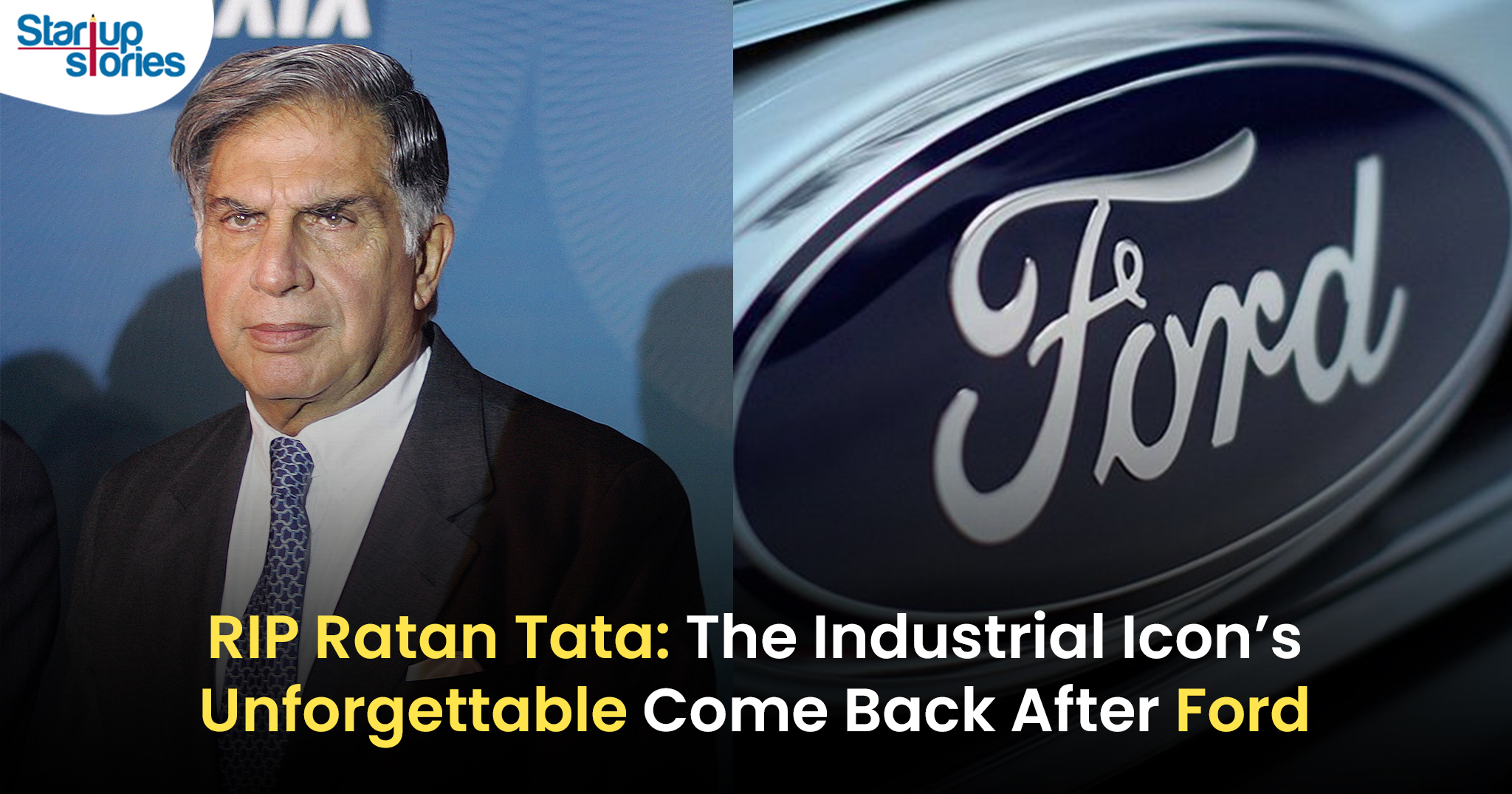Entrepreneur Stories
RIP Ratan Tata: The Trailblazing Industrialist’s!

Remarkable Comeback Against Ford
India mourned the loss of one of its greatest industrial icons, Ratan Tata, who passed away on October 9 at Mumbai’s Breach Candy Hospital. As the Chairman Emeritus of Tata Group, Tata not only made history with numerous groundbreaking achievements but also authored one of the most compelling comeback stories in the corporate world.
The Legendary Saga of Tata versus Ford
One of the defining moments of Tata’s legacy is the legendary saga of Tata versus Ford, a story that has become etched in corporate history. In June 2008, Ratan Tata made headlines by acquiring Ford’s luxury car brand, Jaguar Land Rover, in a deal valued at $2.3 billion. This acquisition not only marked a significant milestone in the automobile industry but also served as a poetic form of revenge against the American automaker, setting the stage for a narrative worthy of a blockbuster film.
The Origins of the Rivalry
The saga began in the late 1990s when Tata Motors, then known as Telco (Tata Engineering and Locomotive Co.), struggled to establish itself with its newly launched car, the Tata Indica. For Ratan Tata, the Indica represented a personal ambition; its success was vital for Tata Motors to become a significant player in India’s burgeoning automobile market.
However, the path to success was fraught with challenges, as the Indica faced a lukewarm reception amid a tough economic climate for the country’s car industry. Amidst these struggles, Tata Motors contemplated selling its passenger car segment, attracting interest from Ford. In 1999, Tata and his team traveled to Detroit for discussions with Ford executives about a potential sale.
The Humiliation
What transpired during the meeting was both humiliating and motivating for Tata. Instead of finding common ground, Ford executives derided Tata, questioning his foray into the automotive sector. One executive even dismissed Tata’s efforts, stating, “Why did you enter the car business? You don’t know anything about it. It would be a favor if we bought your car division.” This encounter left a lasting impression on Tata, who returned to India disheartened yet determined to prove them wrong.
In the following years, Tata poured his energy into improving the Indica’s performance and streamlining operations at Tata Motors. Slowly but surely, the Tata Indica gained traction in the market, eventually becoming a favorite among Indian consumers due to its affordability and status as India’s first diesel hatchback.
A Sweet Revenge
Fast forward nine years to 2008, and the tides had turned dramatically. As the global recession hit, Ford found itself in dire financial straits and decided to divest its luxury car brands, Jaguar and Land Rover. Seizing this moment, Tata Motors stepped in and successfully acquired Jaguar Land Rover from Ford, reversing the narrative of that earlier meeting and turning a painful memory into a triumphant comeback.
The sale of Jaguar Land Rover to Tata Motors not only provided Ford with much-needed relief but also marked a pivotal moment for Ratan Tata—a culmination of perseverance, resilience, and determination. His acquisition symbolized not just a business victory but also a personal triumph, solidifying Tata’s status as a visionary leader in the automotive industry.
Legacy Beyond Business
As we remember Ratan Tata, we celebrate not only his numerous contributions to India’s industrial landscape but also his remarkable ability to turn challenges into opportunities. Under his leadership from 1991 to 2012, Tata transformed the group into a global powerhouse; revenues surged from approximately $5 billion to over $100 billion during his tenure.
Philanthropic Contributions
Beyond his business achievements, Ratan Tata was deeply committed to philanthropy through Tata Trusts, focusing on healthcare, education, and rural development initiatives that touched millions of lives across India. His efforts included funding cancer hospitals and animal care facilities, showcasing his compassion and commitment to societal betterment.
A Personal Touch
In his later years, Ratan Tata became an angel investor in numerous startups and maintained an active presence on social media platforms like Instagram. His posts often featured heartfelt tributes to animals and reflections on life—offering insights into his character beyond corporate leadership.
Conclusion
Ratan Tata will be remembered not only for his remarkable contributions to Indian industry but also for his genuine compassion and commitment to societal betterment. His passing marks a significant loss for India and the global community; however, his enduring legacy will continue to inspire future leaders and innovators for generations to come.
Videos
T.N. Seshan: The Fearless Reformer Who Redefined Indian Democracy

T.N. Seshan’s name stands tall in India’s history as the man who transformed the nation’s electoral system with extraordinary courage and integrity. Born in 1932 in Kerala, Seshan grew up with values of discipline, education, and service to the nation — virtues that shaped his illustrious journey. From his early brilliance at Madras Christian College to his advanced studies in public administration at Harvard University, Seshan’s path reflected rare determination and intellect. Joining the Indian Administrative Service in 1955, he built a reputation as a no‑nonsense officer committed to efficiency and honesty, serving in key roles such as Secretary of Defense and overseeing vital national programs.
As the Chief Election Commissioner of India in 1990, T.N. Seshan sparked a new era of electoral integrity. In a system once marred by corruption, violence, and malpractice, Seshan brought order, fear, and respect through his groundbreaking reforms. He introduced voter ID cards, imposed strict spending limits on campaigns, and insisted on transparency at every level of the election process. Despite criticism from political circles that labeled him dictatorial, his relentless pursuit of fairness empowered every citizen to vote fearlessly. Under his leadership, the Election Commission became a symbol of strength and integrity in Indian democracy.
Seshan’s passing in November 2019 marked the end of an era, but his message continues to resonate across generations. Leaders from every corner of the country mourned the loss of the man who restored faith in free and fair elections. His enduring legacy reminds us that true leadership lies not in wielding power, but in serving people with honesty, courage, and conviction. T.N. Seshan’s life remains a timeless inspiration a reminder that democracy thrives only when its citizens are vigilant, responsible, and fearless.
Entrepreneur Stories
Indian Man Quits JPMorgan, Takes 70% Pay Cut to Launch $6 Million Startup

Leaving behind a high-paying job at JPMorgan, an Indian entrepreneur embraced a 70% salary cut to pursue true purpose and passion in the startup world. Disenchanted with what he described as a “robotic” corporate routine, he sought meaningful work that made a real impact. This pivotal decision marked the beginning of his new journey, one focused on value creation rather than titles and corporate perks.
Powered by resilience and fresh perspective, the entrepreneur launched his own startup, prioritizing innovation and hands-on solutions. The road was challenging, but his vision resonated with the market: the startup quickly gained traction and raised $6 million—an impressive acknowledgement of its potential in a competitive landscape. Every hard lesson from early setbacks and bootstrapping paid off in real customer growth and investor confidence.
Today, his journey stands as an inspiring example for professionals seeking authentic success outside the corporate grind. By trading comfort for creative freedom, he grew a venture that solves important problems, generates jobs, and builds wealth beyond just salary. For ambitious founders, his story highlights the power of risk-taking, adaptability, and relentless focus on impact in India’s thriving startup ecosystem.
Videos
Larry Page: The Visionary Co-Founder Behind Google’s Global Success

Larry Page is a visionary technology entrepreneur and co-founder of Google, one of the world’s most influential companies. Born in 1973 in Michigan, Page grew up surrounded by computer technology, which inspired his passion for innovation from an early age. He studied computer engineering at the University of Michigan and later pursued his PhD at Stanford University, where he developed the revolutionary PageRank algorithm with Sergey Brin. This technology fundamentally changed the way search engines rank websites, making Google the most accurate and popular search engine globally.
The journey of Larry Page and Google began in 1998 when they officially launched the search engine from a small garage. Leveraging their unique algorithm, Google quickly surpassed competitors due to its ability to deliver highly relevant search results, transforming internet search forever. Under Larry Page’s leadership as CEO, Google expanded beyond search to launch groundbreaking products including YouTube, Gmail, and Google Maps, turning it into a global tech powerhouse that shapes how we access and interact with information online.
Larry Page later became the CEO of Google’s parent company, Alphabet Inc., driving innovation and investment in next-generation technologies such as artificial intelligence, autonomous vehicles, and healthcare solutions. His visionary leadership and commitment to technological advancement have cemented his legacy as one of the most influential figures in the tech industry. Today, Larry Page remains a key influencer in shaping the future of technology and digital innovation worldwide.














^Inregistrare pe www.binance.com
February 25, 2025 at 5:38 pm
Can you be more specific about the content of your article? After reading it, I still have some doubts. Hope you can help me.
Ekqodymo
May 28, 2025 at 1:49 am
Tuklasin ang mga nangungunang online casino na may ranggo para sa 2025. Ihambing ang mga bonus, pagpipilian ng laro, at pagiging mapagkakatiwalaan ng mga nangungunang platform para sa ligtas at kapaki-pakinabang na paglalaromga aktibidad ng casino
jbyxe
June 7, 2025 at 6:52 am
order clomiphene pills where buy clomiphene no prescription where can i get cheap clomiphene pill can you buy cheap clomiphene without a prescription how to buy generic clomiphene how to get clomiphene can i buy generic clomid no prescription
aausagwmj
July 18, 2025 at 1:58 am
Marzysz o słodkim życiu bez ryzyka? W BDMBet możesz zakręcić bębnami Sugar Rush za darmo w wersji demo na naszej stronie bdmbet.casino. Ta sama gra, ta sama cukierkowa chaotyczność, tylko bez zakładu. Dlaczego by nie spróbować? Oto dlaczego: GraSugar Rush 1000 nie jest przeznaczona dla osób o słabym sercu ze względu na wysoką zmienność, ale zaufaj mi, nagrody są warte ryzyka. Mówimy o oszałamiającym RTP wynoszącym 97,5% i genialnym potencjale maksymalnej wygranej wynoszącym 25 000-krotność zakładu. Aby spojrzeć na to z perspektywy, jeśli postawisz tylko 1 € na obrót, możesz odejść z 25 000 €. Maks. Wygrana. Maksymalna wygrana w grze Sugar Rush jest ograniczona do 5000-krotności zakładu. Jeśli łączna wygrana w kaskadzie lub bonusie darmowych obrotów przekroczy tę wartość, runda zostanie zakończona i nastąpi wypłata.
https://www.adrien-collignon.com/jak-zmienic-dane-osobowe-w-profilu-bizzo-casino_1752670796/
Tutaj powiemy ci, dlaczego Aviator Betting Game jest uważany za hazard i jak twórcy chronią się przed oskarżeniami o manipulowanie kontami. Dowiesz się również, w których krajach gra w Aviator jest legalna i co wpływa na legalność samej produkcji. Uwaga! Oferta specjalna dla wszystkich zwolenników gry kasynowej na telefonie i tablecie! Pobierz Slottica Casino App i wpłać swój pierwszy depozyt, a otrzymasz 20 EUR za darmo. Przeznacz dodatkowe środki na dalszą grę – obstawiaj wygodnie i szybko, mając ulubione kasyno zawsze pod ręką. Aplikacja do gier Aviator dla urządzeń z systemem iOS oferuje kompleksowe wrażenia z gry dostosowane do łatwego w obsłudze interfejsu Apple. Zachowuje te same podstawowe funkcje, co wersja komputerowa. Użytkownicy mogą również uzyskać dostęp do statystyk na żywo i korzystać z funkcji czatu w grze.
grpjlujdv
July 21, 2025 at 8:35 pm
The first to recognise the potential of gaming on the GO in 2005, Play’n GO is a B2B leading online slots provider in the casino industry having developed some of the world’s most-played online casino games including Reactoonz and Moon Princess. Aix Les Bains Casino 100 Free Spins Bonus 2025 Slot Starz Megaways By Pragmatic Play Demo Free Play Nostalgia Casino No Deposit Bonus Codes For Free Spins 2025 ELK Studios have really knocked it out of the park with the graphics on their Toro series, and Buffalo Toro is no different. There’s a lot happening in this release, particularly in the base game, which really helps to keep things ticking over, especially for players in territories without feature buy options. The Wild Toro Feature continues to be a well executed and exciting one, especially now with 4,096 ways to win, so there’s no need to land anything in a particular place. The aim in the base game is a simple one – land Matador Symbols as far away from Toro Wild Symbols as possible, and hopefully see a few wild line wins.
https://esoncontabil.com.br/spribe-mines-is-redefining-slot-gaming-heres-why/
Buffalo King Untamed Megaways follows Big Bass Mission Fishin’ and Medusa’s Stone as the latest slot in Pragmatic Play’s award-winning portfolio. Buffalo King Megaways has the same symbols as its predecessor, Buffalo King, minus the lowest card symbol, 9. The payouts for these animal and card symbols have been altered from the original slot, but the Buffalo symbol remains the strongest high-paying symbol and is now worth $40 if you line up six of them. You also only need a minimum of two Buffalo symbols in order to generate a win; with the other symbols, you still need three. Here are the highest and lowest payouts per symbol, in descending order: Home > Company News > Casino & games > Pragmatic Play unleashes wild multipliers in Buffalo King Untamed Copyright © 2025 Playson Limited. All rights reserved.
MM88
November 7, 2025 at 12:22 am
Với giao diện mượt mà và ưu đãi hấp dẫn, MM88 là lựa chọn lý tưởng cho các tín đồ giải trí trực tuyến.
J88
November 7, 2025 at 12:25 am
Đến với J88, bạn sẽ được trải nghiệm dịch vụ cá cược chuyên nghiệp cùng hàng ngàn sự kiện khuyến mãi độc quyền.
站群程序
November 8, 2025 at 8:47 am
搭载智能站群程序,自动化搭建与管理,为SEO项目提供核心驱动力。站群程序
iwin
November 9, 2025 at 4:50 am
iwin – nền tảng game bài đổi thưởng uy tín, nơi bạn có thể thử vận may và tận hưởng nhiều tựa game hấp
MM88
November 18, 2025 at 2:35 am
Khám phá thế giới giải trí trực tuyến đỉnh cao tại MM88, nơi mang đến những trải nghiệm cá cược thể thao và casino sống động.
GO88
November 24, 2025 at 2:45 pm
Tham gia cộng đồng game thủ tại Go88 để trải nghiệm các trò chơi bài, poker phổ biến nhất hiện nay.
Kuwin
November 26, 2025 at 8:25 am
kuwin sở hữu kho game đa dạng từ slot đến trò chơi bài đổi thưởng, mang đến cho bạn những giây phút giải trí tuyệt vời.
holland casino venlo neukundenbonus
December 20, 2025 at 4:29 pm
Um Zugang zum Casino zu erhalten, müssen Sie mindestens 18 Jahre
alt und angemessen gekleidet sein. Es gibt berühmte Spielautomaten mit progressivem Fort Knox Jackpot, an den alle
landbasierten Casinos in Österreich angeschlossen sind. In den meisten landbasierten Spielbanken der Alpenrepublik sind die Spiele
in mehrere Zonen unterteilt, in denen „kleine“ und
„große“ Glücksspiele präsentiert werden.
Die neue Spielauswahl von Golden Link bietet dir bereits ab
einem Einsatz von 50 Cent goldene Gewinn-Möglichkeiten. Modern ausgestattet, elegant designt und mit Ausblick
auf den Wörthersee, verbindeter konzentriertes Arbeiten mit
feinem Ambiente. Der großzügige Seminarraum bietet den perfekten Rahmen für Meetings, Firmenveranstaltungen und exklusive Incentives.
Glaselemente in Raumhöhe erlauben einen großartigen Blick auf den Wörthersee.
Glaselemente in Raumhöhe erlauben einen großartigen Ausblick auf den Wörthersee.
2013 startete sie im Casino Salzburg in ihre erste Managementposition im Bereich Marketing und war zuletzt als Senior Casino
Manager tätig. Der traumhafte Blick auf den Wörthersee und das mediterrane Flair von Uferpromenade, Cafés,
Restaurants und Bars lassen in Velden die Nacht zum Tag werden. Das Nachtleben in Velden wogt um
das elegante Casino mit Ausblick auf den Wörthersee.
References:
https://online-spielhallen.de/royal-casino-erfahrungen-mein-umfassender-uberblick-als-10-jahriger-spieler/